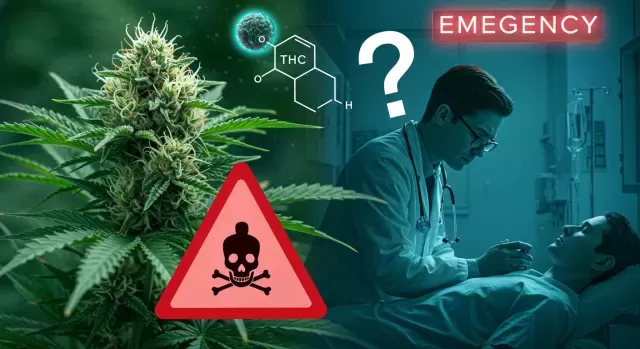The High Cost of High Potency: Exploring the Link Between Modern Cannabis and Psychosis
Aug 12, 2025
As cannabis potency soars, experts are raising concerns about its link to mental health issues, particularly psychosis and schizophrenia.

Cannabis use has evolved dramatically over the last two decades, marked by a significant increase in the concentration of tetrahydrocannabinol (THC), the primary psychoactive compound. This rise in potency raises serious questions about the potential impact on mental health, especially concerning the development of psychosis and schizophrenia. This article explores the growing evidence linking high-potency cannabis to these serious mental health concerns and what you need to know.
The THC Revolution: A Five-Fold Increase
The cannabis landscape has undergone a seismic shift in recent years. Legalization and evolving cultivation practices have led to a dramatic surge in THC levels. Studies show that the average THC content in cannabis has increased by a staggering five-fold since the early 2000s. What was once a relatively mild substance now packs a significantly more potent psychoactive punch.
Dr. Nicholas Fabiano, MD, a researcher with the Department of Psychiatry at the University of Ottawa, notes that this increased THC content is likely a "significant driver in the increasing link between cannabis use and schizophrenia." This alarming trend underscores the urgent need to understand the implications of modern cannabis use.
THC Content Increase in Canada
| Year | Average THC Content |
|---|---|
| Early 2000s | ~4% |
| 2025 (Current) | ~20% |
The Potency-Psychosis Connection: Unpacking the Risks
The link between cannabis use and psychosis is complex, but research increasingly points to high-potency THC as a major contributing factor. Several key factors increase the risk:
- High-Potency Cannabis: Using cannabis with a THC content exceeding 10% significantly elevates the risk of psychosis.
- Frequent Use: The more frequently someone uses cannabis, the greater the potential for developing psychosis.
- Young Age: Adolescents and young adults are particularly vulnerable, as their brains are still developing.
- Male Gender: Studies suggest that males may be at a higher risk.
- Pre-existing Mental Health Conditions: Individuals with a history of mental disorders like depression or anxiety are also more susceptible.
Cannabis-Induced Psychosis and Schizophrenia: A Closer Look
The relationship between cannabis use, cannabis-induced psychosis, and the development of schizophrenia is a critical area of concern. A large-scale study in Ontario involving nearly 10 million people revealed some startling statistics:
- Individuals visiting the emergency department for cannabis use had a 14.3-fold higher risk of developing a schizophrenia-spectrum disorder.
- Those visiting for cannabis-induced psychosis had a staggering 241.6-fold higher risk.
These findings emphasize the significant risk associated with severe cannabis-related episodes and the potential for long-term mental health consequences.
Understanding the risks
| Factor | Increased risk |
|---|---|
| Visiting emergency for cannabis use | 14.3-fold |
| Visiting emergency for cannabis-induced psychosis | 241.6-fold |
Navigating Treatment and Recovery
Addressing cannabis-related psychosis and preventing further mental health complications requires a multi-faceted approach.
- Cessation of Cannabis Use: The first and most crucial step is to stop using cannabis entirely. Continued use after a psychotic episode significantly increases the likelihood of recurring symptoms.
- Antipsychotic Medication: For individuals experiencing severe or prolonged symptoms, antipsychotic medication can be highly effective in managing psychosis.
- Behavioral Therapies: Therapies like motivational interviewing and cognitive behavioral therapy (CBT) can provide valuable support in overcoming cannabis dependence. These therapies can help individuals develop coping mechanisms, manage cravings, and adhere to treatment plans.
Seeking Professional Help: A Critical Step
If you or someone you know is struggling with cannabis use and experiencing mental health symptoms, seeking professional help is essential. A physician or psychologist can provide a comprehensive assessment, develop an individualized treatment plan, and offer ongoing support.
The Future of Cannabis and Mental Health: A Call for Awareness
The increasing potency of cannabis presents a significant public health challenge. Raising awareness about the potential risks, especially among young people, is crucial. Responsible cannabis use, informed decision-making, and access to mental health support are essential to mitigate the potential harms associated with modern cannabis.
